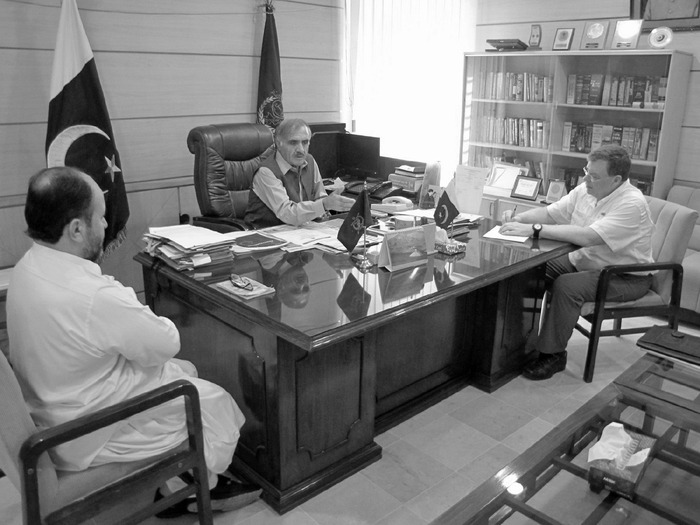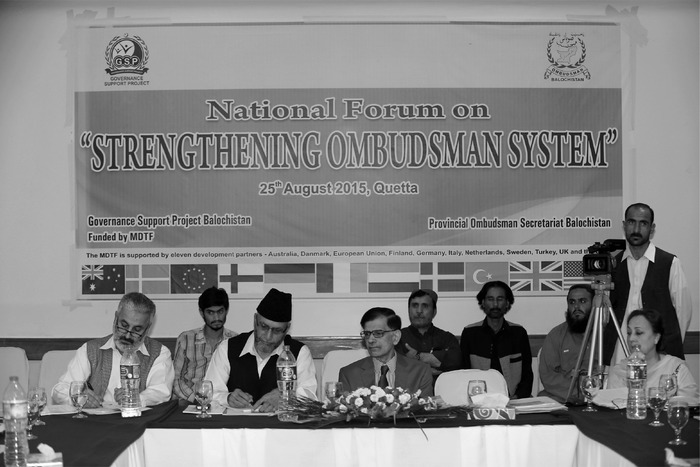-
1 Historical Background to the Ombudsman
The first classical or governmental Ombudsman in Pakistan was appointed in 1983 – The Federal Ombudsman of Pakistan. Since then the institution of the Ombudsman has been developed for federal (tax, financial institutions, harassment in the workplace) and provincial (Sindh, Punjab, Khyber Pakhtunkhwa and Balochistan) governmental redress of citizen complaints. The Balochistan Ombudsman was developed as part of a trend in Pakistan for provinces to have an Ombudsman.
The Balochistan Ombudsman was established by the provincial law – The Establishment of the Office of the Ombudsman for the Province of Balochistan Ordinance, 2001 (the Ordinance); and further by a regulation – Province of Balochistan Regulation numbered PMS/ADM/2(47)0858-62/2005, a regulation – laying down the procedure for registration, investigation and disposal of complaints under the Ordinance (The Regulation).The current definition of a Classical Ombudsman found in the literature states:
In most countries around the world parliamentary control bodies are established, which monitor and implement the rule of law, the fight against corruption and good public administration. Although the specific role of the Ombudsman institution may vary, the holder of this office is legitimized by parliament, either through direct elections or through appointment by the head of state or government by or after consultation with parliament.
The role of the Ombudsman is to protect the people against violation of rights, abuse of powers, unfair decisions and maladministration. Ombudsman institutions play an increasingly important role in improving public administration while making the government’s actions more open and its administration more accountable to the public.1x See <www.theioi.org/the-i-o-i> (accessed 3 September 2015).
The Office of the Ombudsman and the work that the Balochistan Ombudsman does are established by Provincial Ordinance and Regulation.
The Balochistan Ombudsman is an independent, impartial and neutral officer of the Government of Balochistan. The Ombudsman’s function is to act as an Alternative Dispute Resolution (ADR) officer, and hearing officer, for the population of Balochistan who may wish to lodge a complaint about maladministration. The purpose of the office is to ensure that citizens have been treated fairly. The Ombudsman will act as an impartial officer and will attempt to resolve complaints about unfair treatment by using ADR techniques.The Ombudsman may on a complaint by an aggrieved person, on a reference by the Governor, or the Provincial Assembly or on a motion of the Supreme Court or a High Court made during the course of any proceedings before it or his own motion, undertake any investigation into any allegation of mal-administration on the part of any Agency or any of its officers or employees.2x “The Ordinance” Section 9(1).
The objective of the Balochistan Ombudsman’s Office is “to ensure that members of the citizenry receive fair and equitable treatment and administrative fairness throughout the Province of Balochistan administrative and operational units”.3x Results Based Management Accountability Framework 2015, p. 3.
Figure 1 The Honorable Ombudsman
-
2 The Multi-Donor Trust Fund
The World Bank-administered Multi-Donor Trust Fund was formed in August 2010 at the request of the Government of Pakistan and development partner countries to respond to the crisis in Khyber Pakhtunkhwa, Federally Administered Tribal Areas and Balochistan. The MDTF provides a coordinated financing mechanism for the Government of Pakistan’s sector and investment projects and programmes in KP, FATA and Balochistan.4x <www.pakistanmdtf.org/who-we-are.html> (accessed 25 February 2016).
The objective of the MDTF is to support reconstruction and development aimed at recovering from the impact of the crisis and reducing the potential for renewed crises, as well as long-term rehabilitation. MDTF projects are executed by the Governments of Pakistan, KP, FATA and Balochistan. Australia, The Netherlands, Denmark, the European Union, Finland, Germany, Italy, Sweden, Turkey, UK and the USA have contributed $205.2 million through the Fund to support these rehabilitation activities.5x Id.
The Multi-Donor Trust Fund is administered by the World Bank Country Office in Islamabad. The World Bank has established and funded Governance Support Project (GSP) offices in each of the three provinces. The GSP for Balochistan is located in the provincial capital of Quetta.
The stated objective of the GSP is as follows:The Governance Support Project’s objective is “to improve the delivery and efficiency of the core Government departments through institutional strengthening and support to Government of Baluchistan, while responding to priority governance needs under Baluchistan Development Need Assessment (BDNA).6x See <www.gspisu.org.pk/>.
Strengthening the capacity of the Ombudsman is one of four priorities for the GSP. The GSP contracted Dr. Fowlie to conduct an overall evaluation of the Office of the Ombudsman, and the use of Online Dispute Resolution was one of the areas of operations that Dr. Fowlie looked at.
-
3 Issues Impacting the Ombudsman
There are practical matters outside the control of the Ombudsman that presently impact both the province and the operations of the Ombudsman:
Balochistan is geographically the largest province in Pakistan, but has a sparse population of 9.5 million, many of whom live in remote rural areas that have poor communications and transportation infrastructure and few government facilities;
The population of Balochistan includes, by UNHCR7x United Nations High Commissioner on Refugees. estimates, 2.6 million displaced Afghans;
Balochistan has a low literacy level across its general population, with low levels of education8x “Balochistan at a Glance” statistics indicate a literacy rate of 44% for males over age 10, and 22% for females over age 10. The statistics do not indicate in which language citizens were literate. ;
The concept of the Ombudsman is relatively unknown in the population;
The security situation in Balochistan is impacted by the Taliban and terrorists, which restricts movements of officials in the Province;
The language of the Provincial Government, including the Ombudsman, is English, while the majority of the population speaks Pashto, followed by Urdu, Brahvi, Balochi and tribal languages;
Electricity supply is low, and so are internet penetration and computer literacy;
The Provincial administration is broken down into 32 districts, each of which poses administrative, logistical, infrastructure and security issues;
The Ombudsman’s budget is insufficient to meet its operational requirements;
Regions of Balochistan remain culturally attached to tribal and jirga systems.
-
4 What About the Use of ODR?
Dr. Fowlie, as an NCTDR Fellow, has generally recommended the use of Online Dispute Resolution (ODR) when there are issues concerning a dispersed population.9x See <www.ombudsassociation.org/IOA_Main/media/SiteFiles/docs/JIOA-15-V8-1-Rainey_Fowlie.pdf> and <www.ombudsassociation.org/Resources/IOA-Publications/IOA-Journal/Journal-PDFs/JIOA-(4)2.aspx> (p. 50). However, there are several factors that will impact the use of ODR in Balochistan at the present time.
First, the level of general literacy and computer literacy is low in Balochistan. While ODR may be a desirable cutting edge service to provide the citizenry, the lack of potential users does not, in the evaluator’s opinion, merit the expense.
Second, there is a lack of computer infrastructure and internet services in much of the province. While there is a high penetration of mobile phones in the community, the literacy factor diminishes the utility of smartphone applications (apps).
Third, the Investigations Officers at HQ lack computer literacy and skills to be effective users of an ODR system.
On the positive side, the Case Management Information System (CMIS) set up under funding from the GSP is adaptable for ODR functionalities such as chat and email. This will enable the implementation of ODR as the deterring factors are eliminated. The Balochistan University of Information Technology Engineering & Management Sciences (BUITEMS) is a resource to assist the Ombudsman in the development of a district technology use strategy.Figure 2 Pakistan Ombudsman Forum
-
5 Recommendations Made as a Result of the Evaluation
Dr. Fowlie recommends that the Balochistan Ombudsman use staff resources in the districts (District Officers and Complaint Desk Interns) to create complaint files using the CMIS and the online complaint form on the Balochistan Ombudsman webpage. The District staff should assist citizens of all literacy levels to use these systems to initiate complaints. This is something that can easily be encouraged and implemented.
Dr. Fowlie also recommends that the Ombudsman use simple online tools such as Skype and Skye video (both are free services) to augment communication between citizens in the districts with the HQ Quetta. This would be useful for interviews in the fact-finding process, and potentially for hearings. As the staff and interns in the local offices have internet access and basic hardware this could be easily implemented.
As a final recommendation, Dr. Fowlie suggests that another environmental scan be conducted in two and a half years to see if there are societal shifts taking place that would further encourage the use of ODR in Balochistan. -
1 See <www.theioi.org/the-i-o-i> (accessed 3 September 2015).
-
2 “The Ordinance” Section 9(1).
-
3 Results Based Management Accountability Framework 2015, p. 3.
-
4 <www.pakistanmdtf.org/who-we-are.html> (accessed 25 February 2016).
-
5 Id.
-
6 See <www.gspisu.org.pk/>.
-
7 United Nations High Commissioner on Refugees.
-
8 “Balochistan at a Glance” statistics indicate a literacy rate of 44% for males over age 10, and 22% for females over age 10. The statistics do not indicate in which language citizens were literate.
-
9 See <www.ombudsassociation.org/IOA_Main/media/SiteFiles/docs/JIOA-15-V8-1-Rainey_Fowlie.pdf> and <www.ombudsassociation.org/Resources/IOA-Publications/IOA-Journal/Journal-PDFs/JIOA-(4)2.aspx> (p. 50).
DOI: 10.5553/IJODR/235250022016003001007
International Journal of Online Dispute Resolution |
|
| Article | The Balochistan Ombudsman and Online Dispute Resolution |
| Keywords | Pakistan, Balochistan, Ombudsman, capacity building, Online Dispute Resolution |
| Authors | Frank Fowlie en Sher Shah Khan |
| DOI | 10.5553/IJODR/235250022016003001007 |
|
Show PDF Show fullscreen Abstract Author's information Statistics Citation |
| This article has been viewed times. |
| This article been downloaded 0 times. |
Suggested citation
Frank Fowlie and Sher Shah Khan, "The Balochistan Ombudsman and Online Dispute Resolution", International Journal of Online Dispute Resolution, 1, (2016):69-74
Frank Fowlie and Sher Shah Khan, "The Balochistan Ombudsman and Online Dispute Resolution", International Journal of Online Dispute Resolution, 1, (2016):69-74
|
In August 2015 Dr. Frank Fowlie, a Fellow with the National Centre for Technology and Dispute Resolution at the University of Massachusetts – Amherst, acted as an external evaluator to review the Ombudsman of Balochistan. Part of his evaluation concerned the use of Online Dispute Resolution as a mechanism to increase citizen engagement with the Ombudsman. |

